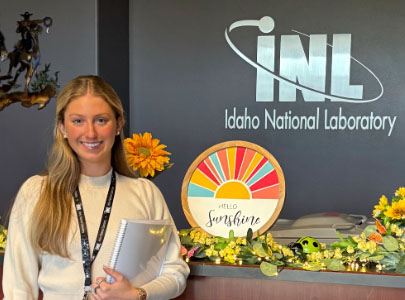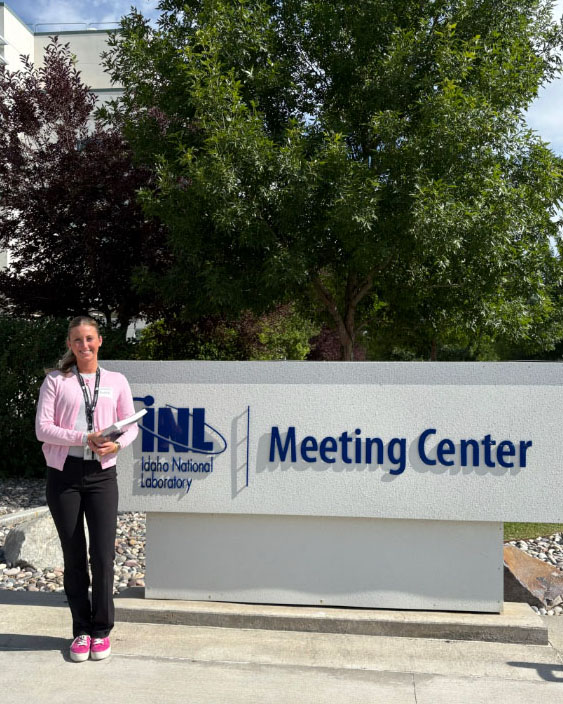LSU Student Shares How a Top Cybersecurity Lab Internship Renewed her Passion to Protect America
July 17, 2025
Foreign adversaries are actively trying to disrupt critical infrastructure—like power grids and water systems—in the United States. Such attacks could endanger hospitals, transportation, public safety, and more.

Lillian Beck
– Photos provided by Lillian Beck
Lillian Beck, who recently graduated summa cum laude with a degree in computer science from LSU, is a summer intern at Idaho National Laboratory (INL) and on a mission to protect the systems that keep America running.
Beck, from Austin, Texas, has learned that to stop hackers, sometimes you have to think like a hacker. She had the opportunity to do that and much more during hands-on training at INL, one of the nation's leading research centers for nuclear energy and homeland security.
“We simulate attacks, access vulnerabilities, and train to respond because when it comes to national infrastructure, the margin for error is zero,” she said. “Working at the lab has taught me the importance of cyber and that it’s crucial to keeping the lights on, water flowing, and the country secure. There is no room to take anything lightly.”
This fall, she’ll return to LSU to pursue a master’s degree in computer science, focusing on cybersecurity, from LSU’s Division of Computer Science & Engineering in the College of Engineering. She’ll arrive with a renewed passion for national security and a desire to broaden and deepen her technical skillset to keep the country safe.
In Her Words
We asked Beck to share her experiences and passion for the cybersecurity field:
About the Internship
INL is a leading national lab dedicated to nuclear energy under the Department of Energy (DOE). We work across all areas of nuclear technology, developing new solutions, supporting clean energy alternatives, and ensuring the protection of vital infrastructure.
My position is a National and Homeland Security Researcher, and I have multiple roles at this internship that vary from project to project. But the broad view of what I do is that I focus on securing Industrial Control Systems, and I simulate realistic attack scenarios that adversaries might use to compromise critical infrastructure.
I reverse engineer hardware and firmware to uncover flaws and vulnerabilities, so we can address them before they become a threat. Foreign adversaries pose a significant threat today, so we work to protect the industrial and operational systems essential to the nation’s safety and stability.
My time at this internship has been incredible.
Team-Based Security Training

I recently participated in a red team/blue team Industrial Control Systems (ICS) cybersecurity training that was held by the Cybersecurity and Infrastructure Security Agency (CISA) and INL.
This training was all week, and operational technology (OT) people from around the world flew in for this amazing training. The first few days we learned everything about ICS security, and then on the last day, I was put on the red team, the hacking team, for the exercise, and we were actively hacking into a simulated chemical plant against the blue team, the defense team.
This whole exercise was to teach OT professionals how to protect their systems more securely.
Many major utility companies from around the world work with INL because INL leads research for the Department of Energy.
Additionally, I’ve been collaborating closely with cybersecurity experts who have been incredibly supportive, taking time to mentor me and address all my questions. I feel incredibly lucky to be interning with INL.
Career Goals: Defend the Grid
My time at the lab has furthered my career goals and completely changed my perspective on a lot of things. Since being at a nuclear lab, I have learned the criticality of securing our nation’s infrastructure.
Since I started working at the lab, I have seen firsthand how essential it is to protect our infrastructure, which literally powers our country. Without reliable energy, modern society cannot function.
Imagine a major city losing its power, essential services like transportation, hospitals and medical equipment, water supply, and public safety would be severely disrupted. Whether we realize it or not, virtually every system we depend on is tied to the power grid.
We have seen real attacks:
- In Ukraine, Russian-linked hackers used malware like BlackEnergy and Industroyer to shut off power to hundreds of thousands of people.
- State-sponsored groups like Chinas "Volt Typhoon" and Russian operatives have infiltrated US energy networks, waiting to strike.
Foreign adversaries like China and Russia are actively trying to disrupt our systems and if they succeed, they could cripple our power grid. That's why labs like INL partner with CISA and DOE to build and test defenses against these threats.


Advice for Students
Going into cybersecurity changed my life, and being able to do it through LSU was an amazing opportunity. I highly recommend that students pursue the cybersecurity program at LSU. It’s a field full of opportunity, and with the rising demand for cybersecurity experts, there is a place for anyone who’s curious and motivated.
Consider how diverse the field is; there are so many directions you could take, from digital forensics, incident response, ethical hacking, operations, etc.
Technology is enhancing at a rapid pace, which also means that the need for security is at an all-time high. Being in a field where I know the work I am doing is impactful and I can contribute to meaningful projects is very important for me.
Also, I recommend getting as many internships as possible, starting with your first summer in college.
Having an internship early in your academic journey gives you a major advantage. It not only exposes you to how cybersecurity works in the real world but also helps you explore different areas of the field, which helps in building both your confidence and clarity on the path you would like to pursue.
Next Step
Discover stories showcasing LSU’s academic excellence, innovation, culture, and impact across Louisiana.


